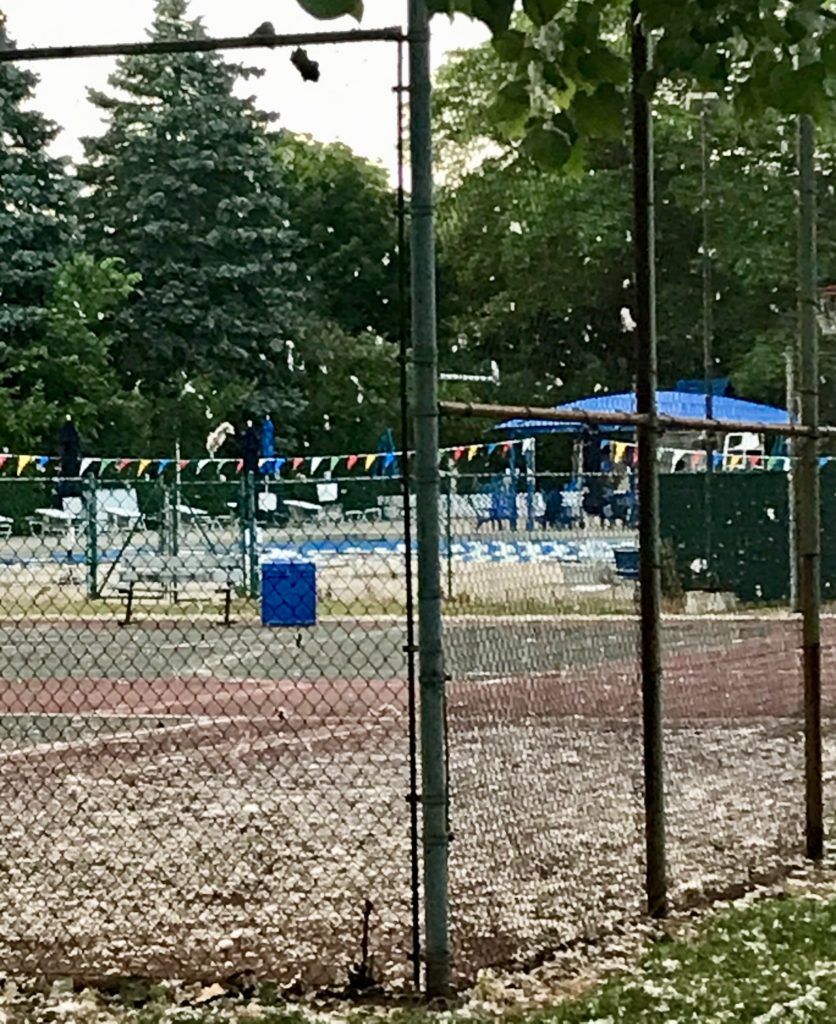Inspired by Jeanine Hathaway’s “ex-nun poems.” Read a few of them here.
The ex-teacher knows not to expect anything profound to happen the first day she swims laps. It is pouring down rain, and she is wearing a bathing suit so modest she’s not sure she isn’t wearing it backwards. She will not remember anything or find anything out about herself in this setting, but she dives in because the water is warmer than it is outside and right away she freestyles because that’s what she sees her kids do. Effortlessly.
It is not effortless for her. When will this end, she thinks. How is this even possible? When was she ever able to do this? Surely her memory is a lie. She was never this strong.
She did it in Australia. Swam some test so that she could prove she was strong enough to scuba dive in the Great Barrier Reef. Physically, she was strong enough. She could tread, and swim, she could jump off a boat with 80 pounds of equipment on her back.
Mentally – emotionally – though, she was not capable. She did not have the strength to swim with cucumber fish and also sharks and who knows what else is down there in the sort of depths of the ocean.
It was 45 feet below water, when it’s no longer possible to know up from down and there are cliffs in the ocean that she gripped the instructor’s hand and didn’t let go. It was in that other land she found one place where she didn’t have to apologize for being afraid, for taking up too much space, for making everyone wait, for being unsure. She couldn’t apologize even if she wanted to. Never mind her instincts to do it – to pull off her mask and say, “I’m sorry.” She would die if she said it.
She’s told this story before, she remembers as she swims and gasps for air and thinks this is like pushing a semi truck through water. Her body is a semi-truck. She’s told it in classrooms, and once wrote about it and the essay got published – her second one. She related it too teaching, this idea of not needing to apologize when we are learning something new, when we are afraid, when we take a lot of time, when we think we are not capable, when we do not know what we are doing.
Four laps of freestyle. That’s enough, and she switches to breaststroke. She is gasping for air. This must be the most difficult thing she’s ever done.
She likes the way it feels to push the water with her arms – like flying, she wonders. Her legs feel more in control, more powerful, and she realizes the more space she takes up, the farther and faster she can go. Swimming is still hard but she found a rhythm to her breathing and she is no longer gasping for air.
For fun she dives low, as low as she can go, like she did when she was a kid and doing somersaults and handstands and whatever else she couldn’t do on land because of balance and gravity. In the water, she is weightless.
She switches to backstroke, but has no idea if she’s doing it right. She’s never tried, but her hands are in blades, like fins, and her legs kick water high in the air and it punches the raindrops for a split second before they thud into the water. She doesn’t know when she’ll get to the other side, and she is worried about crashing into the wall of the pool. How do they know when they’re getting closer? She stops, flips over and looks. She is barely half-way there.
Still, she thinks. There ought to be a sign. Something that says she’s getting closer to where she’s supposed to be. She doesn’t want to crash. She doesn’t want to get hurt.
There was a moment when she thinks she knew she was done teaching. She was standing at the whiteboard, writing, and nothing was wrong, everything was going right, and she thought: I want to do something else.
Then, in Detroit, one afternoon they were supposed to be talking about Percy Jackson, but somehow ended up talking about Romeo and Juliet and her students said, “What kind of messed up story is that? Tell us more! Where’s that book?” And she thought this is exactly what I want to be doing.
And then she left.
//
The ex-teacher sits on her deck with her husband staring at the pool.
“There are flags hanging above the pool,” she says. “How long have those been there?”
He looks and says, “I think they just put them up.”
“What are they for?” she asks.
“Lap swim and swim team. So you know when you’re getting closer when you’re doing the backstroke.”
“Oh,” she says.
She doesn’t admit that she’s always believed those flags where there for celebration; that they were festive.
Now I have something to guide me, she thinks as she stares at the multicolored flags waving in the wind.


Callie, as always, I love that you write and the way you write and how, even though it’s a story about a teacher going swimming, I find myself in it. “Now I have something to guide me, ” … yes.